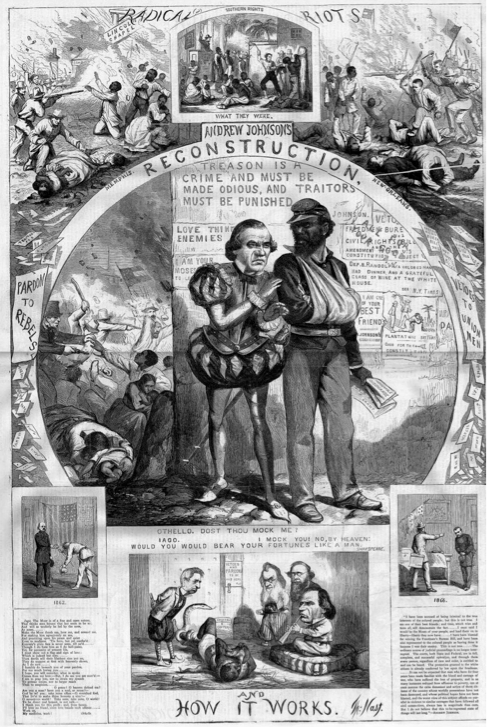
After the Civil War, attempts were made to solve the political, social, and economic problems arising from the readmission to the Union of the eleven Confederate states that had seceded at or before the outbreak of war. President Abraham Lincoln planned to readmit states in which at least 10% of the voters had pledged loyalty to the Union.
This lenient approach was opposed by the Radical Republicans, who favored the harsher measures passed in the Wade-Davis Bill. President Andrew Johnson continued Lincoln’s moderate policies, but enactment in the South of the black codes and demand in the North for stricter legislation resulted in victories for Radical Republicans in the congressional elections of 1866. Congress then passed the Reconstruction Acts of 1867, which established military districts in the South and required the Southern states to accept the 14th and 15th Amendments to the Constitution Southern resentment of the imposed state governments, which included Republicans, carpetbaggers, and scalawags, and of the activities of the Freedmen’s Bureau led to the formation of terrorist groups such as the Ku Klux Klan and the Knights of the White Camelia. By the 1870s conservative Democrats again controlled most state governments in the South. Though Reconstruction has been seen as a period of corruption, many constructive legal and educational reforms were introduced. The Reconstruction era led to an increase in sectional bitterness, dissension regarding the rights of blacks, and the development of one-party politics in the South.
Lincoln’s Plan
Even before the war ended, President Lincoln began the task of restoration. Motivated by a desire to build a strong Republican party in the South and to end the bitterness engendered by war, he issued (December 8, 1863) a proclamation of amnesty and reconstruction for those areas of the Confederacy occupied by Union armies. It offered pardon, with certain exceptions, to any Confederate who would swear to support the Constitution and the Union. Once a group in any conquered state equal in number to one tenth of that state’s total vote in the presidential election of 1860 took the prescribed oath and organized a government that abolished slavery, he would grant that government executive recognition.
Lincoln’s plan aroused the sharp opposition of the radicals in Congress, who believed it would simply restore to power the old planter aristocracy. They passed (July, 1864) the Wade-Davis Bill, which required 50% of a state’s male voters to take an “ironclad” oath that they had never voluntarily supported the Confederacy. Lincoln’s pocket veto kept the Wade-Davis Bill from becoming law, and he implemented his own plan. By the end of the war it had been tried; not too successfully, in Louisiana, Arkansas, Tennessee, and Virginia. Congress, however, refused to seat the Senators and Representatives elected from those states, and by the time of Lincoln’s assassination the President and Congress were at a stalemate.

President Andrew Johnson
Johnson’s Plan
Lincoln’s successor, Andrew Johnson, at first pleased the radicals by publicly attacking the planter aristocracy and insisting that the rebellion must be punished. His amnesty proclamation (May 29, 1865) was more severe than Lincoln’s; it disenfranchised all former military and civil officers of the Confederacy and all those who owned property worth $20,000 or more and made their estates liable to confiscation. The obvious intent was to shift political control in the South from the old planter aristocracy to the small farmers and artisans, and it promised to accomplish a revolution in Southern society.
With Congress in adjournment from April to December 1865, Johnson put his plan into operation. Under provisional governors appointed by him, the Southern states held conventions that voided or repealed their ordinances of secession, abolished slavery, and (except South Carolina) repudiated Confederate debts. Their newly elected legislatures (except Mississippi) ratified the Thirteenth Amendment guaranteeing freedom for blacks. By the end of 1865 every ex-Confederate state except Texas had reestablished civil government.
The control of white over black, however, seemed to be restored, as each of the newly elected state legislatures enacted statutes severely limiting the freedom and rights of the blacks. These laws, known as black codes, restricted the ability of blacks to own land and to work as free laborers and denied them most of the civil and political rights enjoyed by whites. Many of the offices in the new governments, moreover, were won by disenfranchised Confederate leaders, and the President, rather than ordering new elections, granted pardons on a large scale.
Early Congressional Legislation
An outraged Northern public believed that the fruits of victory were being lost by Johnson’s lenient policy. When Congress convened (December 4, 1865) it refused to seat the Southern representatives. Johnson responded by publicly attacking Republican leaders and vetoing their Reconstruction measures. His tactics drove the moderates into the radical camp. The Civil Rights Act (April 9, 1866), designed to protect African Americans from legislation such as the black codes, and the Freedmen’s Bureau Bill (July 16), extending the life of that organization (see Freedmen’s Bureau), were both passed over Johnson’s veto. Doubts as to the constitutionality of the Civil Rights Act led the radicals to incorporate (June, 1866) most of its provisions in the Fourteenth Amendment (ratified 1868).
The newly created Joint Committee on Reconstruction reported (Apr. 28, 1866) that the ex-Confederate states were in a state of civil disorder, and hence, had not held valid elections. It also maintained that Reconstruction was a congressional, not an executive, function. The radicals solidified their position by winning the elections of 1866. When every Southern state (except Tennessee) refused to ratify the Fourteenth Amendment and protect the rights of its black citizens, the stage was set for more severe measures.
The Reconstruction Acts
On Mar. 2, 1867, Congress enacted the Reconstruction Act, which, supplemented later by three related acts, divided the South (except Tennessee) into five military districts in which the authority of the army commander was supreme. Johnson continued to oppose congressional policy, and when he insisted on the removal of the radical Secretary of War, Edwin M. Stanton, in defiance of the Tenure of Office Act, the House impeached him (Feb., 1868). The radicals in the Senate fell one vote short of convicting him (May), but by this time Johnson’s program had been effectively scuttled.
Under the terms of the Reconstruction Acts, new state constitutions were written in the South. By August, 1868, six states (Arkansas, North Carolina, South Carolina, Louisiana, Alabama, and Florida) had been readmitted to the Union, having ratified the Fourteenth Amendment as required by the first Reconstruction Act. The four remaining unreconstructed states – Virginia, Mississippi, Texas, and Georgia – were readmitted in 1870 after ratifying the Fourteenth Amendment as well as the Fifteenth Amendment, which guaranteed the black man’s right to vote.
The radical Republican governments in the South attempted to deal constructively with the problems left by the Civil War and the abolition of slavery. Led by so-called carpetbaggers (Northerners who settled in the South) and scalawags (Southern whites in the Republican party) and freedmen, they began to rebuild the Southern economy and society. Agricultural production was restored, roads rebuilt, a more equitable tax system adopted, and schooling extended to blacks and poor whites. The freedmen’s civil and political rights were guaranteed, and blacks were able to participate in the political and economic life of the South as full citizens for the first time.
 The bitterness engendered by the Civil War remained, however, and most Southern whites objected strongly to the former slaves’ new role in society. Organizations such as the Ku Klux Klan arose. Their acts of violence kept African Americans and white Republicans from voting, and gradually the radical Republican governments were overthrown. Their collapse was hastened by the death of the old radical leaders in Congress, such as Thaddeus Stevens and Charles Sumner, and by the revelation of internal corruption in the radical Republican governments; the Grant administration was compelled to lessen its support of them because of growing criticism in the North of corruption in the federal government itself.
The bitterness engendered by the Civil War remained, however, and most Southern whites objected strongly to the former slaves’ new role in society. Organizations such as the Ku Klux Klan arose. Their acts of violence kept African Americans and white Republicans from voting, and gradually the radical Republican governments were overthrown. Their collapse was hastened by the death of the old radical leaders in Congress, such as Thaddeus Stevens and Charles Sumner, and by the revelation of internal corruption in the radical Republican governments; the Grant administration was compelled to lessen its support of them because of growing criticism in the North of corruption in the federal government itself.
